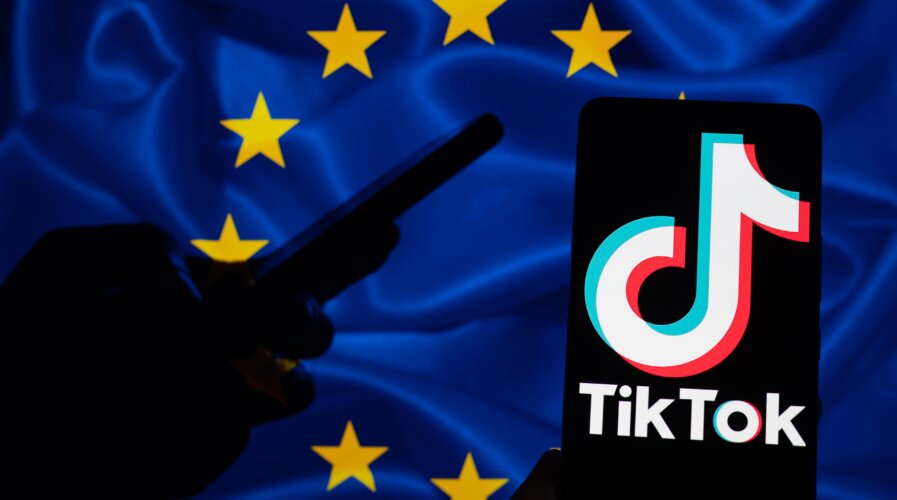
the European Parliament and EU Member States reached a political agreement on the Digital Services Act in late 2022.Source: Shutterstock
TikTok has new features for Europe to comply with EU Digital Services Act
In one week, the European Union will enter a new era where the world’s largest online platforms must comply with sweeping new standards introduced by the Digital Services Act. Kicking in on August 25, 2023, the law will force companies under the Very Large Online Platforms (VLOPs) category to crack down on hate speech, disinformation, and other harmful and illegal material on their sites.
For context, the European Parliament and EU Member States agreed on the Digital Services Act in late 2022. The legislation sets accountability standards across online platforms, better protects users online, and has set a specific timeline for VLOPs to comply with. For instance, online platforms must publish their number of active users by February 17, 2023.
“If the platform or a search engine has more than 45 million users (10% of the population in Europe), the Commission will designate the service as a very large online platform or a very large online search engine. These services will have four months to comply with the obligations of the DSA, which includes carrying out and providing the Commission with their first annual risk assessment,” the Commission stated.
By April 25, the European Commission had made its initial designation decisions under the act, identifying 17 VLOPs and 2 Very Large Online Search Engines (VLOSEs) with at least 45 million monthly active users. The list of VLOPs includes;
- Alibaba AliExpress
- Amazon Store
- Apple AppStore
- Booking.com
- Google Play
- Google Maps
- Google Shopping
- Snapchat
- TikTok
- Wikipedia
- YouTube
- Zalando
Meanwhile, the VLOSEs listed Bing and Google Search. Tthe companies are required to comply, within four months, with the complete set of new obligations under the Digital Services Act. Overall, the new law is also helping make Brussels a trailblazer in the growing global movement to clamp down on tech giants.

The timeline of Digital Services Act as set by the European Commission.
In light of the requirements by the European Commission, TikTok’s owner ByteDance and other large online platforms will be required to police illegal content on their platforms, prohibit certain advertising practices, and share data with authorities. TikTok quickly ensured they were on the good side of the bloc.
On August 4, the video-sharing platform released new measures and features for European users to improve compliance with the incoming Digital Services Act.
How will TikTok abide by the EU Digital Services Act?
Before unveiling its new guidelines, TikTok underwent a voluntary “stress test” the previous month. The result was that EU industry chief Thierry Breton recommended “more work” was needed for the firm to be fully compliant.
“In the coming weeks, we are introducing an additional reporting option for our European community that will allow people to report content they believe is illegal, including advertising,” TikTok mentioned in a blog post.
That means making this as easy as possible, and people can choose from categories such as hate speech, harassment, and financial crimes. “We will provide a guide to help people better understand each category,” TikTok noted. As for content reported as illegal, it will first be reviewed against the platform’s ‘Community Guidelines’ and removed globally if it violates TikTok’s policies.
If it does not, TikTok has a new dedicated team of moderators and legal specialists to assess whether it violates the law, and “we will restrict access to the content in that country only,” TikTok added. Under the DSA, TikTok will inform its European users about a broader range of content moderation decisions.
“For example, if we decide a video is ineligible for a recommendation because it contains unverified claims about an election that is still unfolding, we will let users know. We will also share more detail about these decisions, including whether the action was taken by automated technology, and we will explain how both content creators and those who file a report can appeal a decision,” the blog posting reads.
TikTok is also allowing its European users to turn off personalization for their feed to meet the Digital Services Act requirements. “This means a user’s For You and LIVE feeds will instead show popular videos from both the places where they live and around the world, rather than recommending content to them based on their interests.”
When using a non-personalized search, users will see results of popular content from their region and in their preferred language. Their Following and Friends feeds will continue to show creators they follow, but in chronological order rather than based on the viewer’s profile.
One of the pivotal adjustments made to address TikTok’s European audience concerns enhanced protection for teens’ privacy. Firstly, TikTok said accounts for those under 16 are private by default, and their content cannot be recommended in For You feeds.
To top it off, European users aged 13-17 will no longer see personalized advertising based on their activities on or off TikTok. “People already have control over the ads they can see, and they can toggle personalized ads on or off in their settings,” TikTok concluded.
READ MORE
- 3 Steps to Successfully Automate Copilot for Microsoft 365 Implementation
- Trustworthy AI – the Promise of Enterprise-Friendly Generative Machine Learning with Dell and NVIDIA
- Strategies for Democratizing GenAI
- The criticality of endpoint management in cybersecurity and operations
- Ethical AI: The renewed importance of safeguarding data and customer privacy in Generative AI applications


